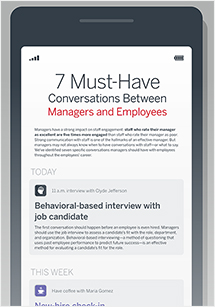Auto logout in seconds.
Continue Logout
Most people are hesitant to engage in deep conversations with strangers because they think it will be uncomfortable, so they resort to small talk instead. But research has found that having deep conversations with strangers can be more rewarding (and less awkward) than you think, Nicholas Epley, Michael Kardas, and Amit Kumar write for the Washington Post.
The 6-step roadmap for that tough conversation
Experimenting with deeper conversations
Epley, a professor of behavioral science at the University of Chicago Booth School of Business; Kardas, a postdoctoral fellow in management and marketing at the Kellogg School of Management at Northwestern University; and Kumar, an assistant professor of marketing and psychology at the University of Texas at Austin, have found that having a deep conversation with a stranger might not be as awkward as you might expect.
In a series of experiments with about 1,800 people, Epley and colleagues found that participants felt happier and more connected than they previously thought they would be after having a deep conversation with someone they had just met.
In one of the experiments, Epley gave a presentation at a small conference of about 50 high-level financial executives and told everyone at the conference to find a partner and discuss four questions with them:
- For what in your life do you feel most grateful?
- If a crystal ball could tell you the truth about yourself, your life, your future, or anything else, what would you want to know?
- If you were going to become a close friend with the other participant, please share what would be important for him or her to know?
- Can you describe a time you cried in front of another person?
Initially, the executives were nervous about having these conversations, Epley and colleagues write. But after 10 minutes, Epley had to spend another 5 asking the participants to stop talking and return to the presentation.
"One person wiped away tears. One pair hugged," Epley and colleagues write. "The initially stern-faced group came back with noticeably more smiles, as if some switch had been flipped."
According to the researchers, on anonymous questionnaires, the participants on average said they felt less awkward, more connected, and happier following their conversation than they initially thought they would.
In a separate experiment, Epley and colleagues gave people deep and shallow questions to ask two different people they had just met. Before the conversations took place, the participants anticipated preferring the shallow questions—but the researchers found that afterwards, the participants preferred the deep conversations.
This remained the case when participants in a separate experiment were asked to write their own shallow and deep questions, Epley and colleagues write.
For shallow questions, participants commonly wrote things like "Where are you from?"; "What do you do for a living?"; and "How is your work going?" For deep questions, participants wrote things like "What do you regret most in your life?"; "What do you love doing?"; and "Where do you see yourself in five years?"
Generally, the participants preferred the deep conversations, Epley and colleagues write, and there were no differences between men and women or extroverts and introverts. People who had a deep conversation with a stranger felt just as happy as if they had a deep conversation with a friend, the researchers found.
Epley and colleagues caution, however, that their research "does not suggest throwing all caution to the wind, assuming everyone wants to be your best friend and revealing your deepest thoughts to anyone you meet."
Rather, their research suggests "that the person next to you would probably be happier talking about their passions and purpose than the weather and 'what's up.'" (Epley et al., Washington Post, 10/13)
Don't miss out on the latest Advisory Board insights
Create your free account to access 1 resource, including the latest research and webinars.
Want access without creating an account?
You have 1 free members-only resource remaining this month.
1 free members-only resources remaining
1 free members-only resources remaining
You've reached your limit of free insights
Become a member to access all of Advisory Board's resources, events, and experts
Never miss out on the latest innovative health care content tailored to you.
Benefits include:
You've reached your limit of free insights
Become a member to access all of Advisory Board's resources, events, and experts
Never miss out on the latest innovative health care content tailored to you.
Benefits include:
This content is available through your Curated Research partnership with Advisory Board. Click on ‘view this resource’ to read the full piece
Email ask@advisory.com to learn more
Click on ‘Become a Member’ to learn about the benefits of a Full-Access partnership with Advisory Board
Never miss out on the latest innovative health care content tailored to you.
Benefits Include:
This is for members only. Learn more.
Click on ‘Become a Member’ to learn about the benefits of a Full-Access partnership with Advisory Board
Never miss out on the latest innovative health care content tailored to you.

